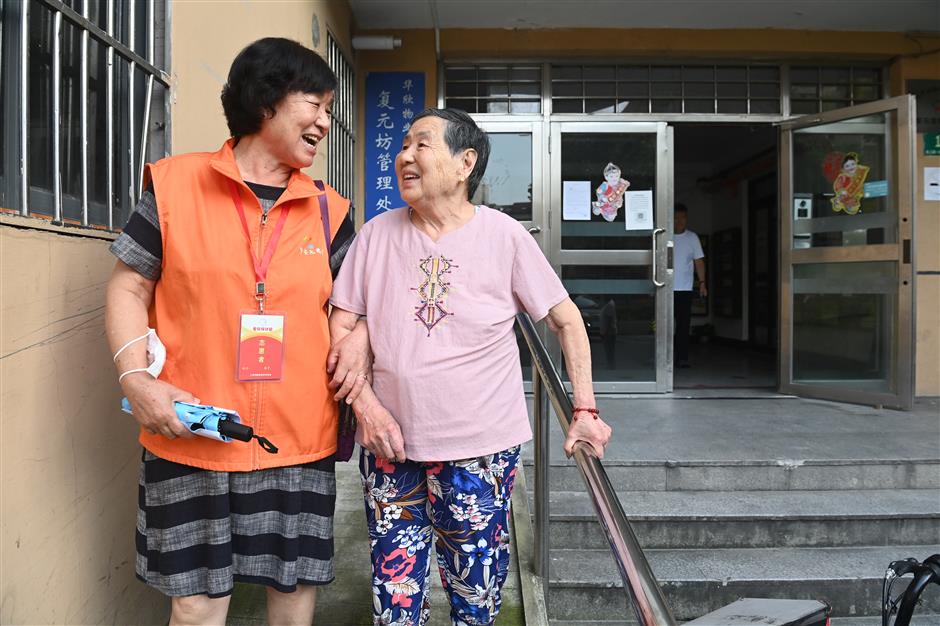Holistic support systems make living easier for old souls of Jing'an

With the "15-minute senior care service circles" set up across Jing'an, local seniors enjoy an easier and safer life.

Jing'an has some contrary charms. It's young, yet old. Its stylish streets bustling with commuters and traffic reflect the city's modern side, while its swinging exterior hides an old soul.
It's often easy to overlook the reality that Jing'an was the first district in the city to enter the "deep aging" demographic category. By the end of 2020, nearly 41 percent of its population were aged 60 years and over.
But in Jing'an, old age doesn't really separate people from urban life. Instead, it is creating a senior-friendly environment for the elderly.
Now, across the district, there are 23 community-based comprehensive senior service centers, 16 senior homes pro viding "respite services" for those who need short-term nursing services and 28 daycare nursing centers, among other facilities.
Together, they form the "15- minute senior care service circles" where senior residents have access to a wide range of services such as meals, nursing and entertainment within a 15-minute walk of where they live.
Take its community-based canteens as an example.
Many old people live separately from their children. Cooking three meals a day is too much for them, and many concoct a supper from leftovers, which is not good for their health. What's more, some live in old buildings without elevators. It's a challenge for them to climb the stairs or use smartphones to buy food. So, the district came up with an idea to build canteens for the elderly.
Now, Jing'an has 91 such canteens which can supply 320,000 meals every month.
The walk to the canteens to eat with their old neighbors takes just several minutes and it costs an average of 10 yuan (US$1.55) for a meal. Or they can order meals delivered to the doorstep, say the district's civil affairs officials.
To promote eldercare services, Jing'an has embraced the digital age. Backed by advancing technologies, a wide range of scenarios have been created. Of subdistricts, Jing'ansi, where 42 percent of population are aged 60 or above, has forged a paradigm of "smart eldercare."
At seven eldercare locations, each of which is within a 15- minute walk from home, senior residents can use face-scanning to make appointments for a wide range of services such as laundry, haircut, housekeeping, food delivery and bathing assistance. Associated fees are automatically deducted from the allowances in their accounts paid by authorities.
This online platform now has 3,517 registered users. Big data has their profiles, including their health conditions. Twenty-six eldercare consultants are on site to make tailored eldercare plans for them, and discover their needs before they are aware.


The subdistrict has also developed a smart "shower butler" digital device installed at community-based bathhouses built for senior residents. It monitors temperatures, humidity and oxygen saturation level, and alerts the user not to shower too long.
It has also installed hundreds of smart "water butler" sensors in the homes of the elderly living alone. By detecting daily water use, the sensors tell officials whether anything abnormal has occurred. Visits will be paid if that happens.
Downtown Jing'an is dotted with old residential buildings, and thus it's also necessary to renovate senior residents' homes to create a safer and age friendly living environment.
So far, more than 800 homes have been renovated. The upgrade covers toilets, kitchens, bedrooms and living rooms as well as handrails, anti-skid products, monitoring devices, among others.
Hu Kezheng, 82, gave the upgrade a thumbs-up. He has been living in an old residential complex at Lane 815 Fenxi Road for decades, and his home fell into disrepair through years of neglect. But he had no time to repair it because he had to take care of his bed-ridden wife. As the renovation project expanded to his neighborhood, he immediately made application.
"All the old wires were replaced with new ones. In the bathroom, two handrails and a shower seat were installed," he said, as he illustrated the upgrades. "The project truly took our elder people's needs into consideration, small changes as they were. But they made our lives better and safer."
For disabled and elderly residents living in buildings without elevators, Jing'an has pioneered the rental of stair chair lifts in Shanghai.
The automated stair chair enables people who are restricted at home to go outside their apartments into the fresh air. It takes about one minute for a chair to climb or descend one story. The service is free, but users need to make an appointment by calling in advance.
Today, cognitive disorder has become an increasing problem, and Jing'an is now working to create a cognitive disorder-friendly community.
According to the district's civil affairs officials, risk evaluation and early intervention are conducted across grassroots communities, and a series of brain-activation activities are designed for patients to take part in on their doorstep.
Also, their families can receive professional psychological consultancy and some respite from taking care of elders with dementia.

















